10 Ways the Esports API Transforms Market Research Insights

10 Ways the Esports API Transforms Market Research Insights
Overview
The esports API offers transformative capabilities for market research by providing access to diverse datasets, real-time information, and advanced analytical tools. These features enhance understanding of consumer behavior and market dynamics. The advantages of these capabilities are significant:
- They enable businesses to make data-informed decisions.
- Identify emerging trends.
- Refine strategies.
Ultimately, this positions them for success in the rapidly evolving esports industry. How can your organization leverage these insights to stay ahead in this competitive landscape?
Introduction
The esports industry is rapidly evolving, driven by an insatiable demand for data and insights that inform strategic decisions. As organizations seek to navigate this dynamic landscape, the esports API emerges as a transformative tool, offering unprecedented access to diverse datasets and real-time analytics. This API not only provides features such as comprehensive data coverage and timely updates but also presents significant advantages, including enhanced decision-making capabilities and improved competitive positioning.
However, the question remains: how can stakeholders effectively leverage these insights to not only keep pace with industry changes but to anticipate and capitalize on emerging trends? This article delves into ten impactful ways the esports API reshapes market research, providing a roadmap for businesses aiming to thrive in this competitive arena.
Initial Data Offering: Access Diverse Datasets for Esports Market Research
The Initial Data Offering (IDO) serves as a pivotal resource for accessing a wide range of datasets tailored for the competitive gaming sector via the esports API. These datasets encompass player statistics, match outcomes, and audience engagement metrics, enabling researchers and businesses to perform in-depth analyses of the industry through an esports API. The availability of diverse datasets is crucial for comprehending consumer behavior and identifying emerging trends, ultimately fostering more informed decision-making within the gaming landscape.
As we look to 2025, the competitive gaming market is poised for continued growth, with an increasing number of datasets becoming accessible for analysis. This trend reflects the rising sophistication of data-driven strategies in this dynamic field. Market research analysts underscore the importance of obtaining precise player statistics and audience engagement metrics via an esports API, as these elements enhance insights and propel strategic initiatives forward.
This commitment to providing high-quality information positions IDO as an essential partner for those navigating the complexities of the competitive gaming environment. How can these datasets inform your strategies? By leveraging the insights derived from IDO, stakeholders can better understand the market dynamics and make data-informed decisions that drive success.
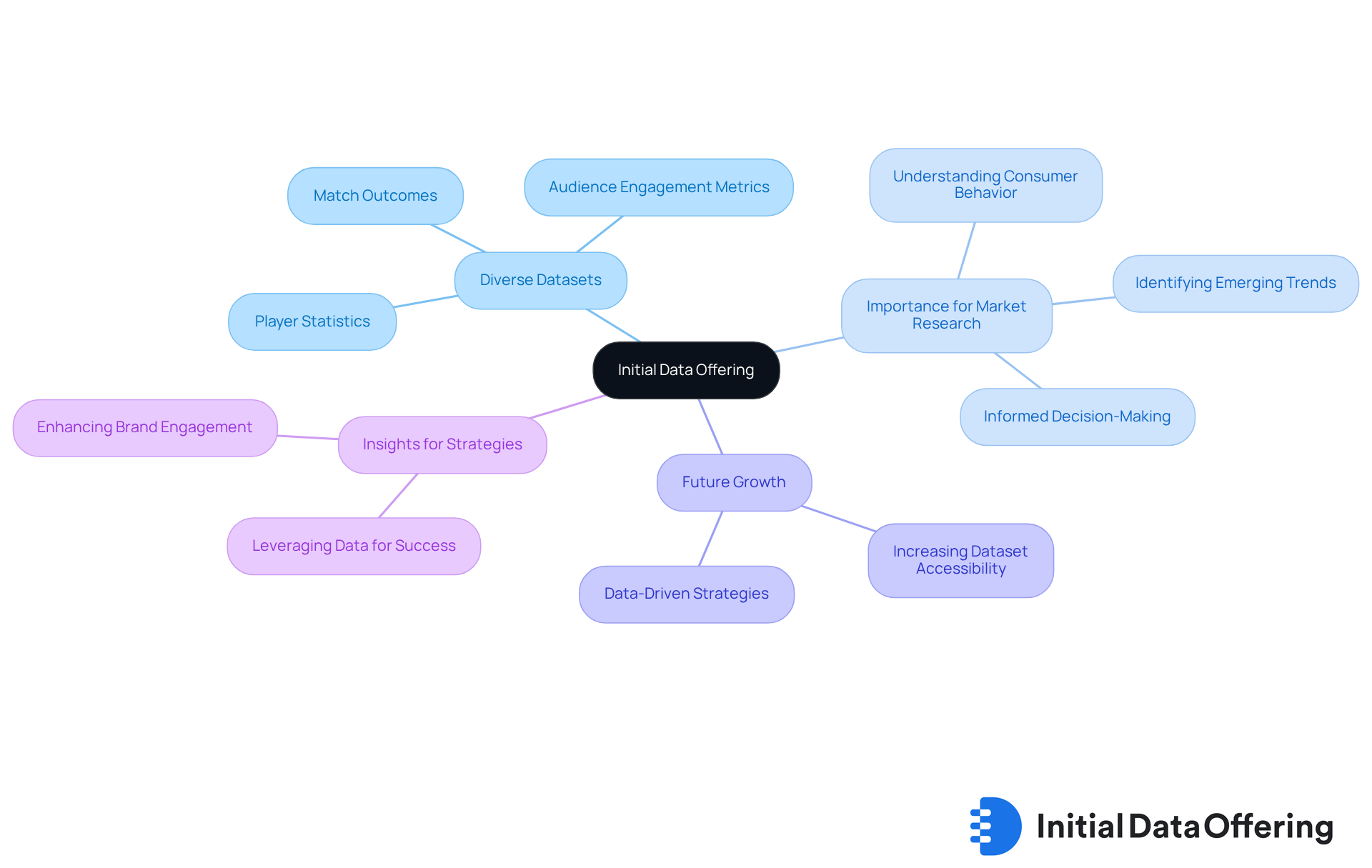
Esports API: Leverage Real-Time Data for Informed Market Analysis
The esports API offers real-time information across various aspects of the gaming ecosystem, such as live match statistics, player performance metrics, and audience engagement insights. This immediate access to data enables companies to conduct timely industry evaluations that accurately reflect the evolving competitive gaming landscape. Consequently, businesses can swiftly adjust their marketing strategies, optimizing their efforts to align with current trends and audience behaviors.
The growth of the esports industry, driven by the esports API, is projected to increase from USD 3.5 billion in 2024 to USD 9.7 billion by 2034, with a compound annual growth rate (CAGR) of 10.6%. This growth is fueled by diverse revenue streams, including media rights, sponsorship, and advertising. The ability to leverage real-time information not only enhances the effectiveness of research but also fosters informed decision-making, ultimately positioning enterprises for success in a rapidly changing industry.
Furthermore, understanding regional dynamics can help research analysts identify areas with significant growth potential, thereby refining their strategies. How can your organization capitalize on these insights to stay ahead in the competitive landscape? By recognizing these trends and adapting accordingly, companies can better navigate the complexities of the esports market with the help of an esports API.
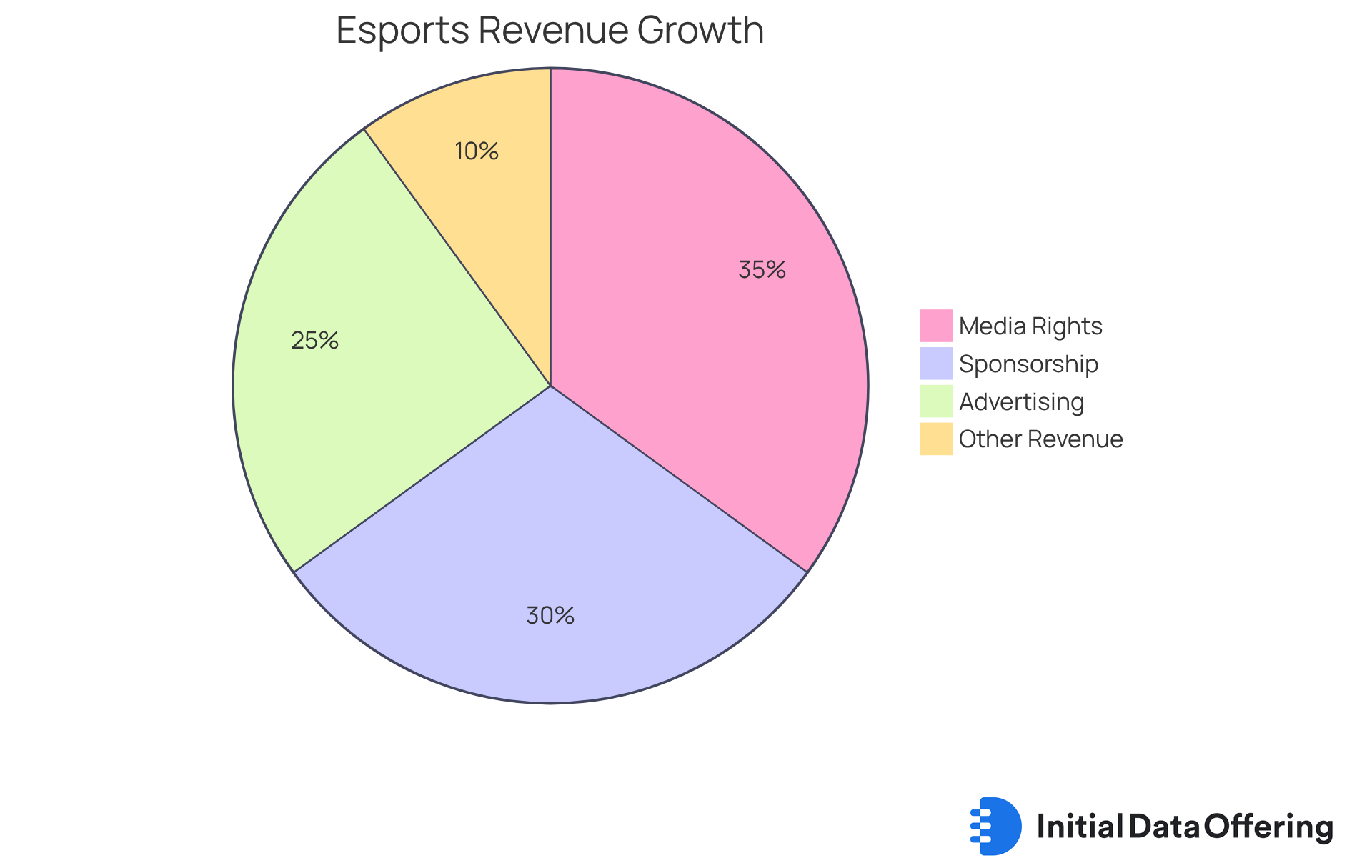
Esports API Integration: Combine Data Sources for Comprehensive Insights
Incorporating the esports API along with diverse information sources, such as social media analytics and historical performance metrics, offers a significant feature for researchers looking to extract comprehensive insights into the esports industry. This multifaceted approach offers the advantage of a deeper comprehension of consumer behavior, industry trends, and competitive dynamics. By integrating information from various platforms, businesses can benefit from developing more effective strategies and making informed decisions based on a broader context. As industry professionals highlight, the integration of varied information sources via an esports API not only enriches the analysis but also enhances the precision of market forecasts.
For instance, how does social media sentiment relate to performance metrics? By utilizing both, one can discern how fan engagement correlates with team success, providing actionable insights that propel strategic initiatives. This integration ultimately transforms raw information into significant narratives, illustrating that this information tells a story about human behavior. However, it is essential to recognize the challenges of information manipulation and the necessity of clean data to ensure accurate analysis.
As industry experts emphasize, failing to leverage comprehensive data insights can lead to substantial revenue losses, with businesses potentially losing $5.2 million due to untapped data. Therefore, organizations must navigate these complexities with confidence to fully harness the potential of the competitive gaming landscape.
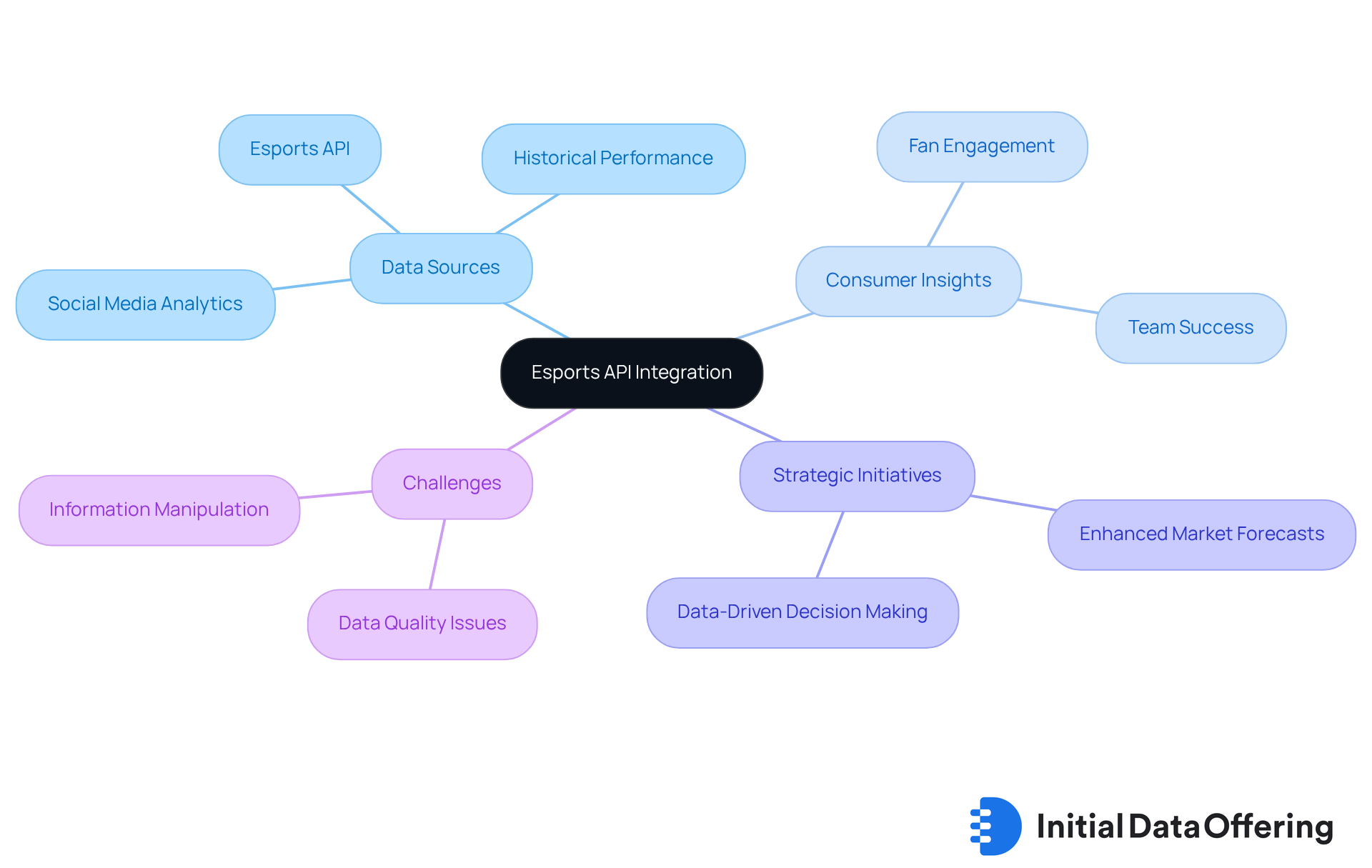
Analytical Tools: Utilize Esports API Features for Enhanced Data Interpretation
The esports API offers various analytical tools that are designed to effectively interpret complex datasets. These tools include features such as data visualization, trend analysis, and predictive modeling, which are particularly relevant for understanding Hazeltree's insights into long and short equity positioning across 15,000 equities sourced from over 600 funds, representing $700 billion in GMV. By leveraging these capabilities, researchers can extract meaningful insights that inform decision-making.
What advantages do these tools offer? By utilizing comprehensive datasets like those from Hazeltree along with the esports API, organizations can gain a clearer understanding of market dynamics. This understanding allows them to identify growth opportunities and refine their strategies based on data-driven insights, ultimately enhancing their competitive edge.
In conclusion, the analytical tools provided by the esports API empower organizations to navigate complex data landscapes. By harnessing these features, they can not only interpret vast amounts of information but also translate it into actionable strategies that drive success in a competitive market.
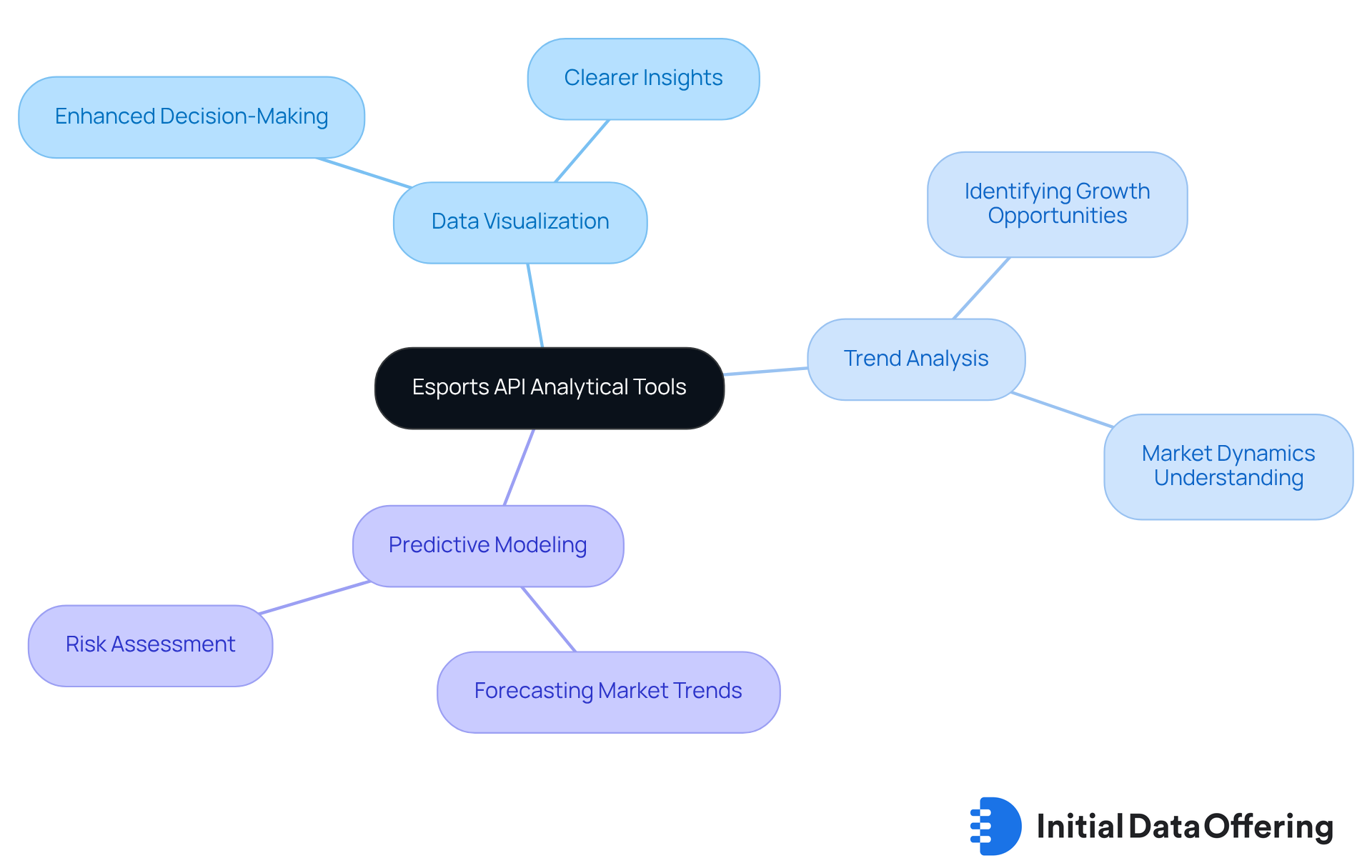
User Engagement Metrics: Analyze Consumer Behavior with Esports API Data
User engagement metrics—such as viewing time, interaction rates, and participation levels in gaming events—are vital for understanding consumer behavior. The esports API provides valuable access to these metrics, enabling businesses to analyze audience engagement with gaming content effectively.
By examining user interactions, companies can refine their marketing strategies to align more closely with their target audience's preferences, ultimately boosting overall engagement. Notably, statistics indicate that audiences are becoming increasingly interactive during competitive gaming events, with average viewing durations significantly surpassing those of traditional media formats.
This insight empowers marketers to develop tailored campaigns that resonate with the gaming community, fostering deeper connections and enhancing brand loyalty.
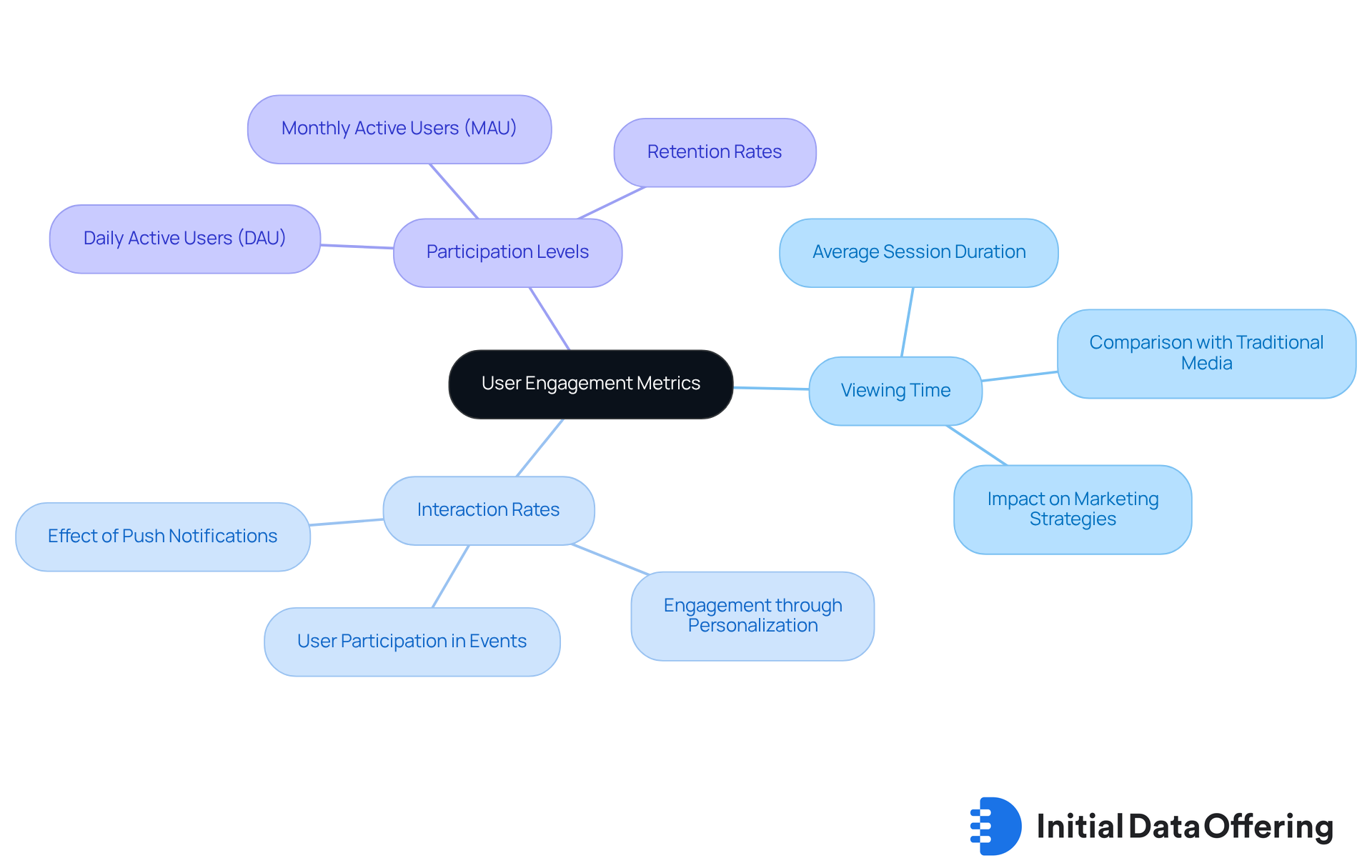
Competitive Landscape Analysis: Use Esports API for Market Positioning Insights
The esports API serves as a vital tool for conducting industry landscape analysis. It supplies critical information regarding rivals' performance, market share, and audience interaction. By leveraging this data, companies can identify their competitive strengths and weaknesses. This understanding enables them to refine their positioning strategies effectively. Comprehending the competitive environment is essential for making informed decisions that foster growth and success within the gaming sector.
How can this data influence your strategic choices? By recognizing key performance indicators and audience engagement metrics, businesses can tailor their approaches to better meet market demands. Ultimately, utilizing the esports API not only enhances operational strategies but also drives informed decision-making. This proactive stance is crucial for thriving in a dynamic industry landscape.
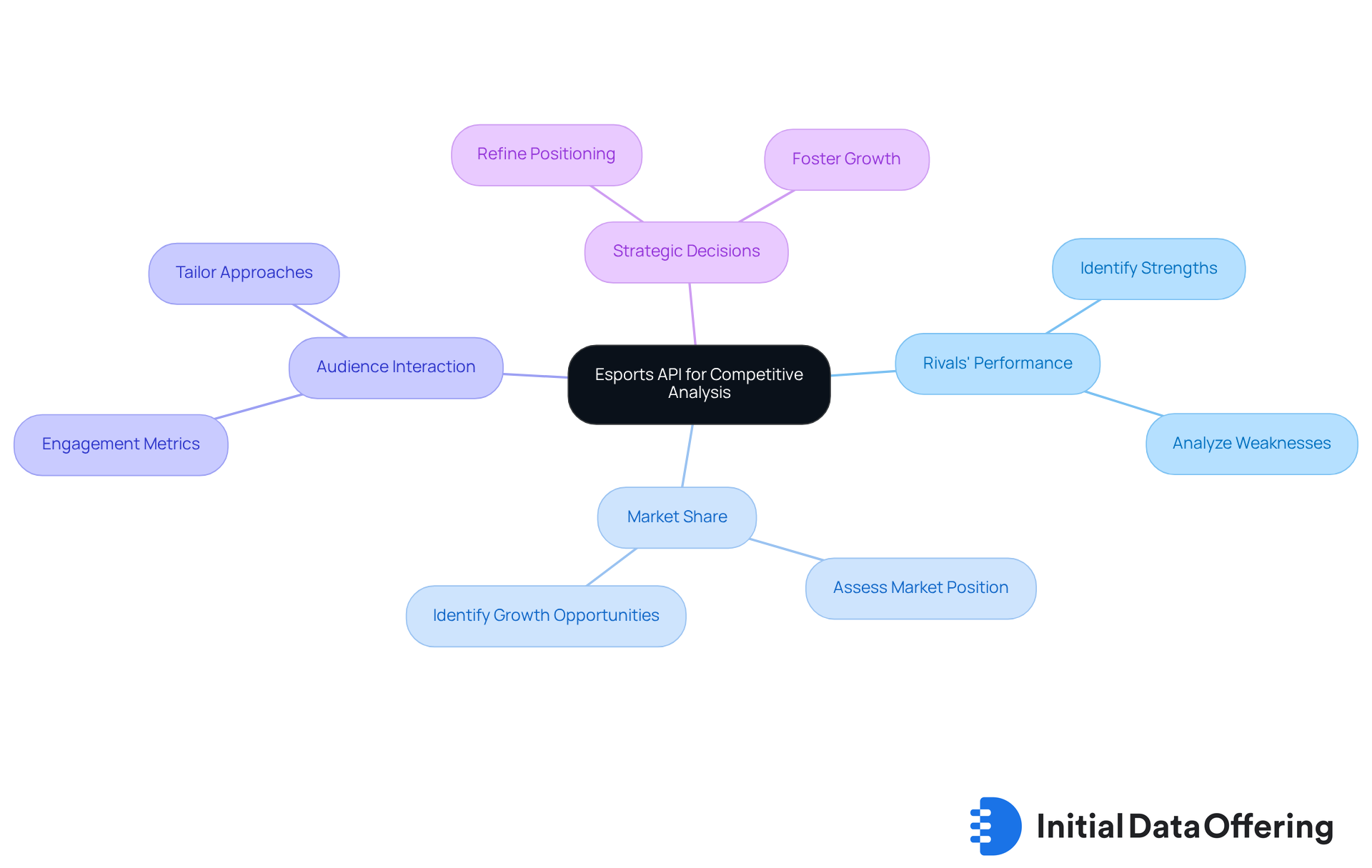
Trend Analysis: Identify Emerging Esports Market Trends with API Insights
The esports API serves as a vital resource for uncovering emerging trends in the competitive gaming sector. By meticulously analyzing data on player performance and audience preferences, businesses can achieve a comprehensive understanding of market dynamics. For instance, in 2024, competitive gaming viewership is projected to reach approximately 611 million, comprising 302 million core viewers and 308 million occasional viewers. This statistic highlights the increasing interest and engagement in this sector. Companies that identify these trends early can capitalize on new opportunities and adeptly navigate potential risks in the rapidly evolving esports landscape.
Successful adaptations to industry changes are evident in various case studies. For example, Epic Games implemented a push notification service to enhance player engagement, enabling effective communication about limited-time modes and new features. This strategic initiative not only bolstered player interaction but also yielded valuable insights into player behavior and preferences.
Moreover, industry experts underscore the necessity of adjusting strategies based on player performance data. With the competitive gaming industry expected to expand significantly, reaching an estimated $18.85 billion by 2035, and a CAGR of 19.95% from 2025, leveraging analytics becomes essential for companies aiming to thrive in this challenging landscape. By utilizing the esports API, organizations can analyze player performance trends and audience preferences, ensuring they remain at the forefront of market developments.
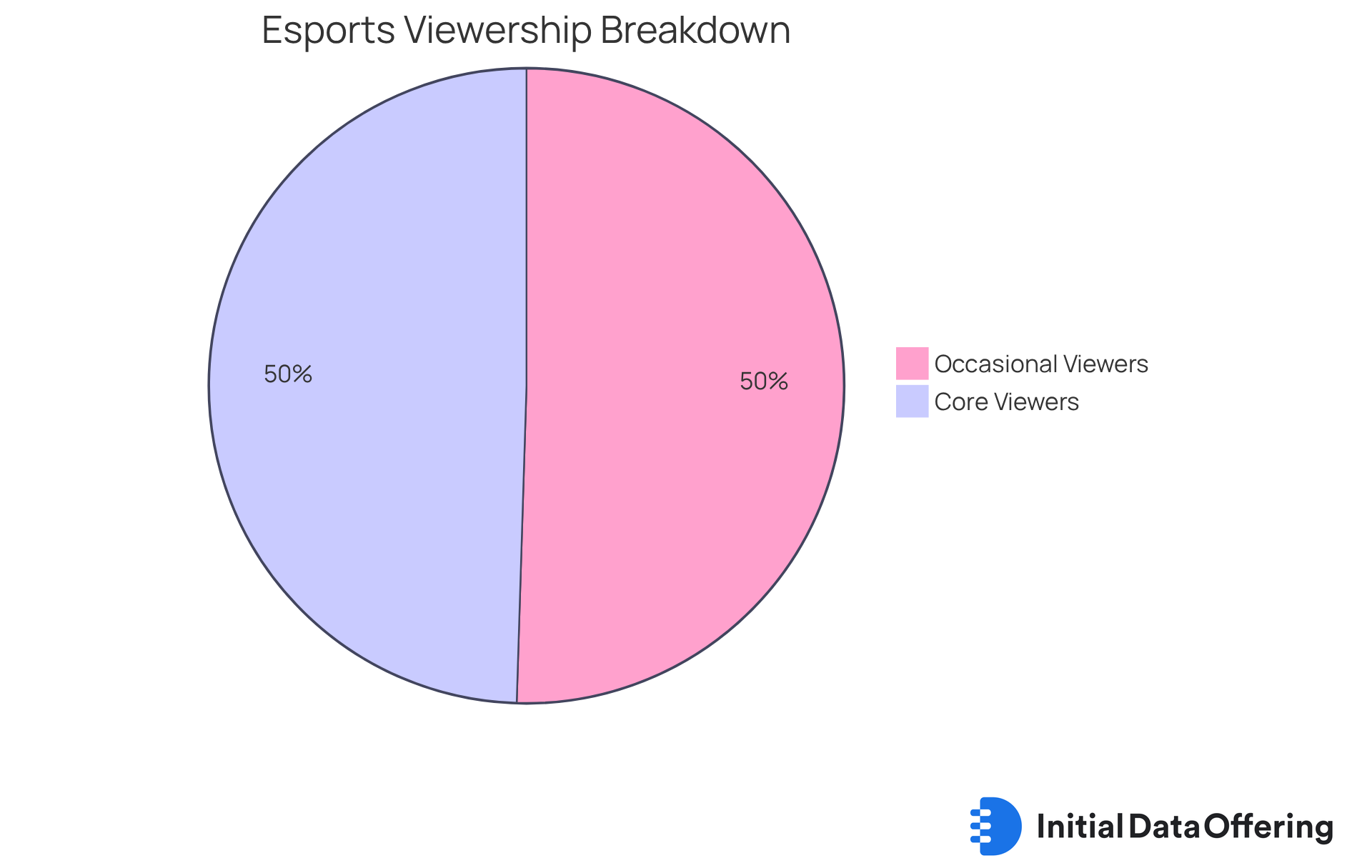
Customization Options: Tailor Your Data Queries with Esports API Flexibility
The esports API offers a variety of customization options, enabling users to customize their queries to meet specific research needs. This adaptability provides businesses with the ability to concentrate on the most relevant information points, ensuring that their analyses align effectively with strategic objectives. By customizing information queries using an esports API, organizations can extract insights that are not only applicable but also directly relevant to their unique industry challenges and opportunities.
For instance, organizations facing specific gaming challenges can leverage customized information analysis to identify trends and consumer behaviors that inform their strategies. As one analyst noted, 'The capability to tailor queries is essential for tackling the specific dynamics of the gaming industry.'
Furthermore, nearly 80% of enterprises engage in research to gather specific insights, underscoring the significance of customized inquiries in achieving successful outcomes. This tailored approach significantly enhances market research results by utilizing an esports API, enabling companies to make informed decisions that drive success in the competitive gaming landscape.
To effectively implement customized information queries, analysts should begin by clearly defining their research goals and pinpointing the specific metrics that will yield the most value.
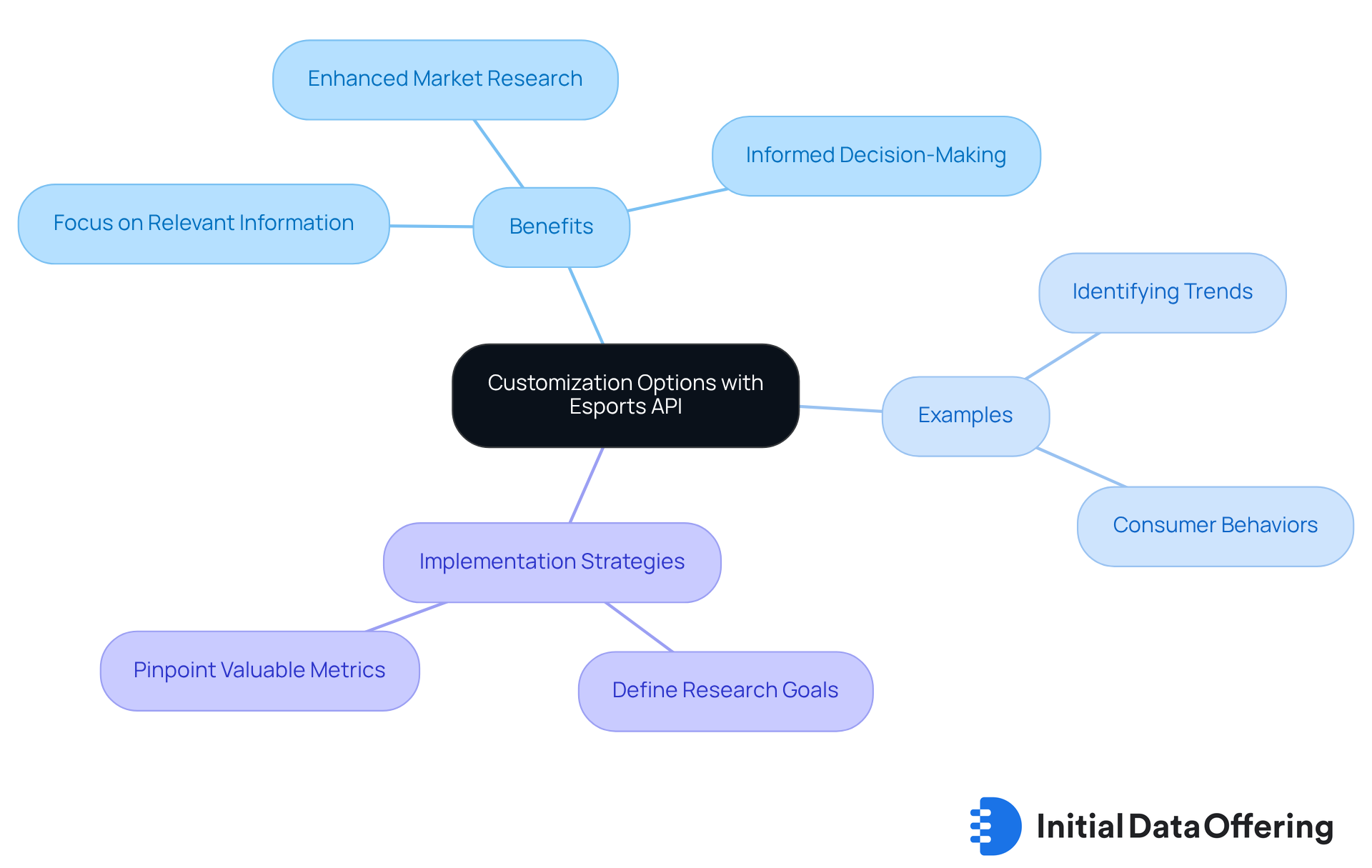
Predictive Analytics: Forecast Future Trends with Esports API Data
The esports API offers robust predictive analytics by providing historical data and advanced modeling capabilities. These features allow companies to examine past performance and trends, which is crucial for predicting future advancements in the gaming industry. The advantage of this foresight is that it empowers organizations to make proactive decisions. Consequently, they can allocate resources efficiently and develop strategies that align with anticipated changes in the industry.
How can your organization leverage this predictive capability to stay ahead? By utilizing these insights, companies can position themselves strategically for future growth.
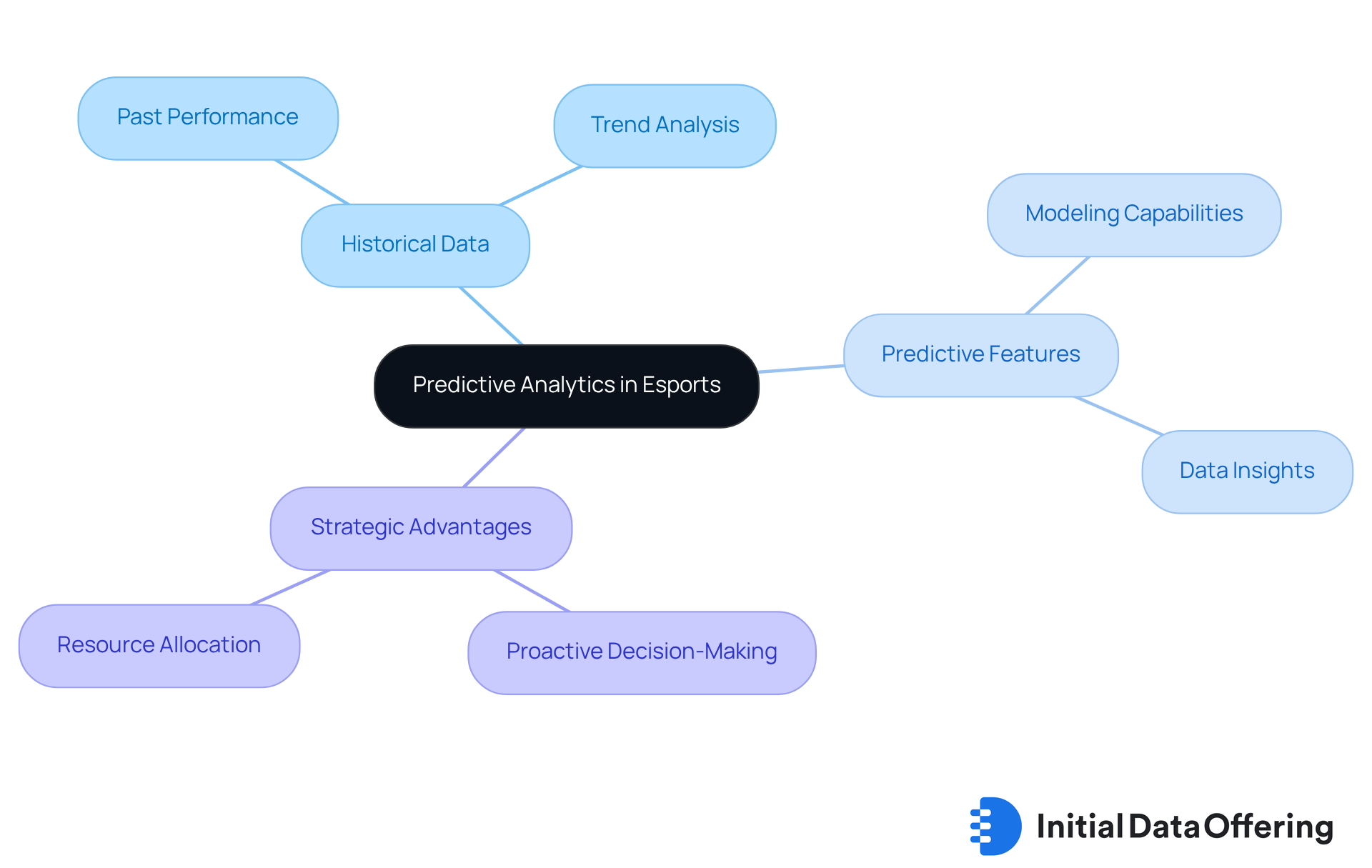
Collaborative Opportunities: Enhance Research Through Esports API Partnerships
Collaborating with organizations and leveraging the esports API significantly enhances research efforts by providing access to diverse data sources and specialized knowledge. These partnerships facilitate knowledge sharing, resource pooling, and collaborative analyses, leading to richer insights.
As Howard Schultz aptly stated, "Success is best when it’s shared," which underscores the mutual benefits of collaboration. By working together, companies can tackle complex research inquiries and foster innovation within the gaming industry.
For instance, a partnership between a leading gaming analytics firm and a major game publisher has yielded innovative insights into player behavior and industry trends, demonstrating the tangible impact of teamwork.
Industry leaders assert that successful partnerships are founded on trust and shared objectives, allowing teams to accomplish more collectively than they could alone. This collaborative ethos not only enhances data access but also propels significant outcomes in esports market research through the use of an esports API.
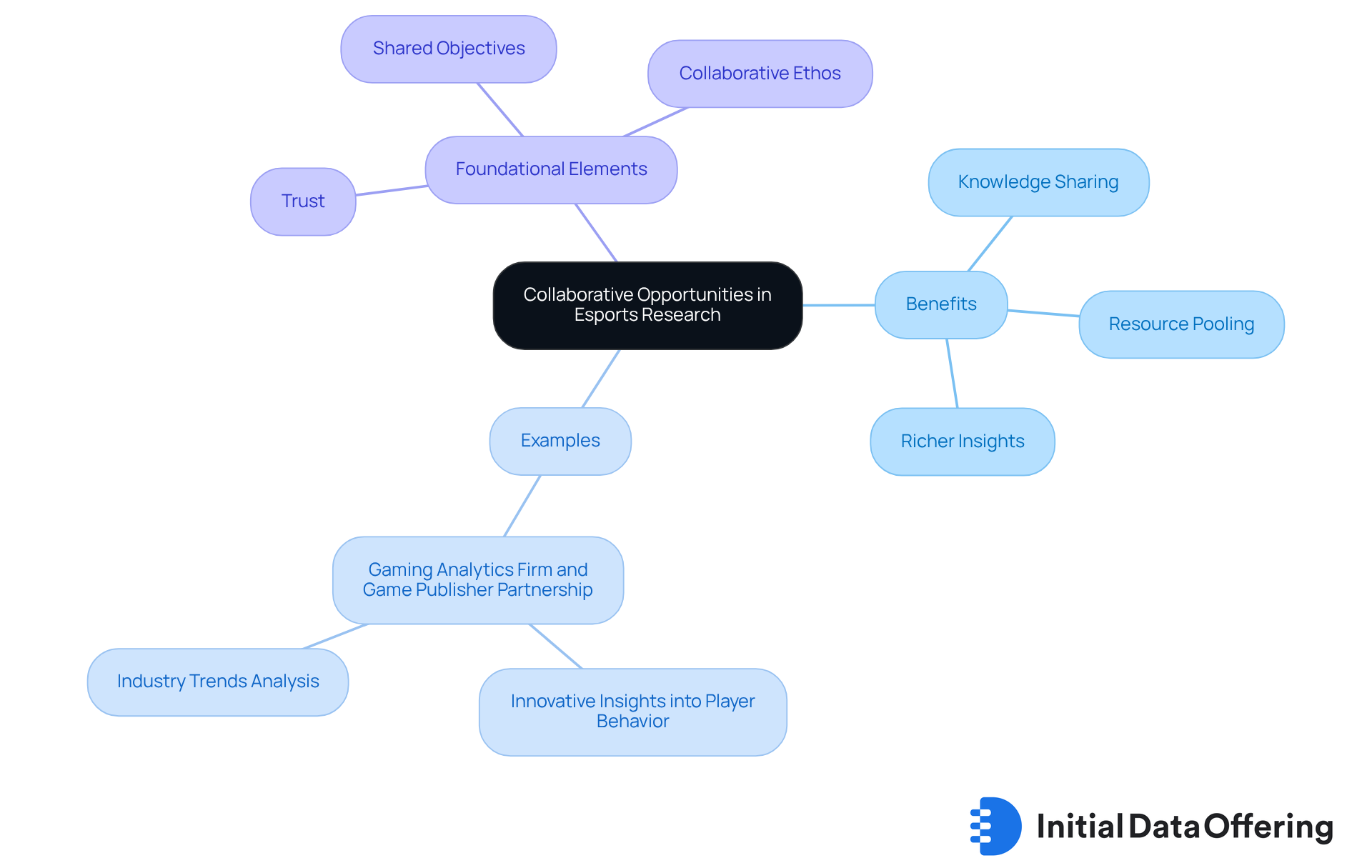
Conclusion
The transformative power of the esports API in market research is evident through its diverse datasets, real-time insights, and advanced analytical tools. These features empower businesses to make informed decisions that align with the dynamic esports landscape. By leveraging these capabilities, organizations can enhance their analysis depth, uncovering valuable insights about consumer behavior and competitive positioning.
Key arguments presented throughout the article illustrate how the esports API facilitates access to critical player statistics, audience engagement metrics, and predictive analytics. These advantages are essential for identifying emerging trends, optimizing marketing strategies, and refining operational approaches. Furthermore, the emphasis on customization and collaboration highlights the importance of tailored data queries and partnerships in maximizing the potential of esports market research.
In a competitive industry poised for significant growth, the insights gained from utilizing an esports API can serve as a catalyst for success. Organizations are encouraged to embrace these advanced tools and strategies to stay ahead of the curve. By doing so, they not only enhance their market positioning but also contribute to the overall advancement of the esports sector. What opportunities might you discover by integrating these insights into your strategies?
Frequently Asked Questions
What is the Initial Data Offering (IDO) and its purpose?
The Initial Data Offering (IDO) provides access to a wide range of datasets for the competitive gaming sector through an esports API. It includes player statistics, match outcomes, and audience engagement metrics, enabling in-depth analyses of the esports industry.
How can the datasets from IDO benefit market researchers and businesses?
The datasets from IDO help researchers and businesses understand consumer behavior, identify emerging trends, and make informed decisions within the gaming landscape, ultimately enhancing strategic initiatives.
What is the projected growth of the esports industry and its driving factors?
The esports industry is projected to grow from USD 3.5 billion in 2024 to USD 9.7 billion by 2034, with a compound annual growth rate (CAGR) of 10.6%. This growth is driven by diverse revenue streams, including media rights, sponsorship, and advertising.
How does the esports API facilitate real-time market analysis?
The esports API provides real-time information on live match statistics, player performance, and audience engagement, enabling companies to conduct timely evaluations and adjust their marketing strategies to align with current trends.
What advantages does integrating the esports API with other data sources offer?
Integrating the esports API with sources like social media analytics and historical performance metrics allows for a deeper understanding of consumer behavior, industry trends, and competitive dynamics, leading to more effective strategies and informed decisions.
Why is clean data important when using the esports API?
Clean data is essential to ensure accurate analysis and avoid the challenges of information manipulation. Inaccurate data can lead to significant revenue losses, with estimates suggesting businesses could lose up to $5.2 million due to untapped data insights.
How can businesses leverage insights from the esports API to stay competitive?
By recognizing trends and adapting their strategies based on real-time data and comprehensive insights from the esports API, companies can navigate the complexities of the esports market more effectively and position themselves for success.